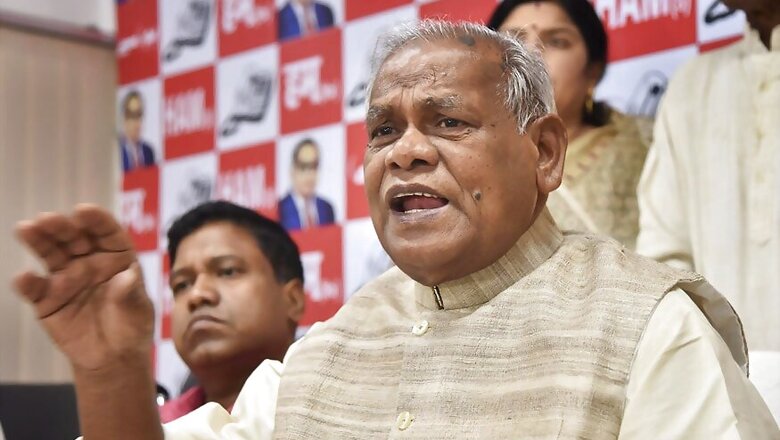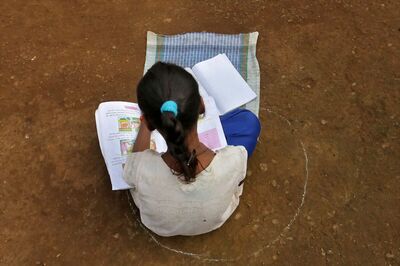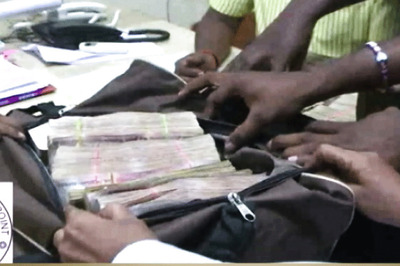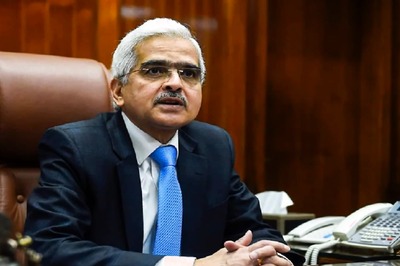
views
Patna: Gaya will witness a tough fight between Grand Alliance candidate Jitan Ram Manjhi and the Janata Dal (United)’s Vijay Manjhi. Amid changing caste equations and a rise in Prime Minister Narendra Modi’s popularity, Jitan Ram has been fighting tooth and nail to reassert his position as a popular leader of the Mahadalits.
Gaya, one of the 40 Lok Sabha seats in Bihar, will vote in the first of the seven-phase polls on April 11. The other seats going to polls in this phase include Nawada, Jamui and Aurangabad parliamentary constituencies, all of which fall in Maoist-affected areas.
Gaya has been a safe seat for the Bharatiya Janata Party (BJP) since 1971, when an MP from the Jan Sangh was elected from the constituency. The saffron party has consistently won from the seat, registering victories in 1977, 1989, 1998, 1999, 2009 and 2014.
The BJP, which is in a seat-sharing arrangement with Nitish Kumar’s JD(U) and Ram Vilas Paswan’s Lok Janshakti Party (LJP) in the state, has left Gaya to the JD(U) and Vijay Manjhi will be up against Hindustani Awam Morcha (Secular) founder Jitan Ram. The third candidate in the fray is the Bahujan Samaj Party’s Dilip Kumar.
The opposition Grand Alliance comprises the Rashtriya Janata Dal (RJD), Congress, Rashtriya Lok Samta Party (RLSP), Jitan Ram’s HAM-S and Vikasshil Insan Party (VIP).
What will work for Jitan Ram
Jitan Ram will bank on the development work initiated during his tenure as chief minister in 2014-2015, which included achievements as diverse as setting up an Indian Institute of Management in Bodh Gaya to trying to solve the problem of water scarcity in the city. Water has been a perennial poll issue in the constituency — the Phalgu river, which flows across the two districts of Gaya and Jehanabad, remains dry for large parts of the year. Almost 60% of households in the city face a scarcity of water, and a majority has no access to potable water.
During his tenure, Jitan Ram had tried to address the problem by proposing the construction of a low-height dam on the Phalgu that would ensure a continuous flow of water in the river for at least six months. The administration had proposed to build a check dam at Kandi Nawada, the last stretch of the river towards Jehanabad, along with a separate drainage system. The cost of the project was pegged at Rs 700 crore.
When Nitish Kumar came to power in 2015, the project was put on the backburner. Jitan Ram claims he has the support of the masses as has continuously tried to work for the city’s development.
“People know how committed I am to the development of Gaya and my work speaks louder than empty promises,” he told News18. “That’s why the people are by my side.”
Jitan Ram is also hopeful of receiving support from disgruntled elements in the BJP who may have been dissatisfied after the seat was given to the JD(U). A trust deficit between BJP and JD(U) workers may work in Jitan Ram’s favour as a number of BJP veterans feel he could switch sides after the election results are declared on May 23.
“If the alliance remains intact and the JD(U) wins Gaya, this traditional BJP seat will forever go to the JD(U)’s fold,” says Alok Kumar Agrawal of Godavari locality.
Jitan Ram is confident of receiving support from several castes, including his Bhuyan caste. The HAM-S also believes that most Muslims and Yadavs will vote for him as well. While Yadavs comprise the largest population of the state on the basis of caste, considerable numbers of both Muslims and Bhuyans will also lead to a swing.
The former chief minister is also trying to woo voters reeling under the severe law regarding total liquor prohibition in the state, which was enacted by Nitish Kumar’s government in April 2016. Under the “draconian” provisions of the legislation, first-time violators were sent to jail, which was a non-bailable offence. After severe criticism from Opposition parties and experts alike, a number of stringent provisions of the Bihar Prohibition and Excise Act, 2016, were watered down last year.
Jitan Ram has accused the state government of misusing the prohibition law to harass the Dalit population and claims that half of the numbers jailed belonged to the community.
Yamuna Singh, a resident of Gaya’s Prachin village, endorsed Jitan Ram’s theory.
“The ban on liquor may not work against Nitish Kumar but the atrocities committed against the people and their families have irked the population against the JD(U), cutting across caste and religious lines,” he said.
Why JD(U) could push ahead
But there are a number of factors that have put the JD(U) in the driver’s seat.
Taking a cue from PM Modi, Nitish Kumar has addressed two to three meetings a day in Gaya to cut Jitan Ram down to size.
Lawyer Madan Tiwari claims BJP supporters in the state, who want to see Modi as prime minister again, will never vote for Jitan Ram. “Initially, there was resentment, but after the PM’s visit local issues are no more relevant,” he adds.
Another factor that could split the Yadav vote bank and work in the BJP’s favour has been the presence of gangster-turned-politician Bindeshwari Prasad Yadav. Bindi Yadav (as he is popularly known), who unsuccessfully contested the 2010 Assembly election from Gurua on an RJD ticket, has been openly sharing the dais with Nitish Kumar to make a dent among Yadav voters.
“Although Yadavs, by and large, will vote for the Grand Alliance, Bindi can influence up to 20,000 to 30,000 of them to vote against the alliance, which may mar the mahagathbandhan’s chances,” says Santosh Yadav, a resident of Bindi Yadav’s Barachatti block.
Another resident from Gaya’s Panchaitiya Akhara believes that the Bhuyan caste vote will split since the contest is against two Manjhi candidates.
“Bhuyans, popularly called Manjhi, are sizable in number and their vote will be divided as both contestants are Manjhi,” says Sravan Manjhi. “Secondly, those belonging to the Manjhi caste are considered passive voters as they belong to a lower strata of society.”
Passive voters are known to influence the voting pattern in remote areas of Bihar.
JD(U) candidate Vijay Manjhi, who has received enormous support from the chief minister himself, is banking on the NDA's initiatives.
“Schemes like the Ujjwala Yojna, Ayushman Bharat Yojna, and giving a grant of Rs 6,000 to women during child delivery are commendable and have helped the poorest of the poor,” says Vijay Manjhi.
Dilip Manjhi, a Gaya resident, says he will vote for the ruling alliance. “Road construction, electricity supply, and various grants have made our life easier. So we will vote for Vijay Manjhi and Nitish Kumar,” he says.
Gaya has six assembly constituencies, with Gaya Town, Sherghati and Wazirganj appearing to favour the NDA. Gaya Town is made up of a large number of people from the Baniya, Chandraswai and Kayastha community, who have traditionally voted for the BJP.
“Gaya Town, besides Sherghati and Wazirganj, always gives massive leads to the BJP. So there is a higher possibility of a win for the NDA,” says Vijay Sinha, a businessman from Maranpur area.
Central Bihar Chamber of Commerce president Kaushlendra Pratap Singh credits the incumbent government for a number of development schemes and says that the ease of doing business has improved in the state. He cites the improvement in physical infrastructure, including quality of roads, as well as better supply of electricity and an upcoming cargo facility as proof of the government’s agenda.
Traditionally, the EBC (Extremely Backward Castes) and the business community have voted for the BJP and Nitish Kumar for a decade, giving the NDA an edge. Abdul Qadir, a senior journalist from Gaya, strikes a note of caution about the voting pattern of the EBCs expected to be the decisive factor. A split in Manjhi votes and the NDA’s development schemes geared towards the Mahadalits could give the JD(U) contestant another reason to rejoice and target a victory.




















Comments
0 comment